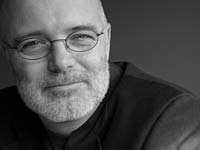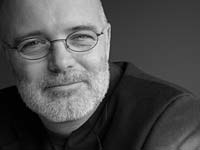Last month the politically polarizing founder of the Moral Majority, Rev. Jerry Falwell, died. Falwell has been credited with mobilizing millions of evangelicals to engage the political process. The religious right, as the movement came to be called, has been a dominant political force ever since.

With the passing of Rev. Falwell, and with the 2008 presidential campaign gaining speed, some are wondering if the religious right will continue to hold its political power. Or, is a new form of Christian political engagement on the horizon. We sat down with Brian McLaren to discuss the political scene and how he believes the church should engage.
What encourages you, and discourages you, about the church and its involvement in the political realm?
My sense is that the religious right has hit its high tide. I think on a whole lot of levels it has been somewhat discredited. But I think the true believers in the religious right will go down with the ship, and I don't think they'll be willing to change their thinking no matter what happens. It's become a sort of ideology that has been absolutized and equated with gospel in their minds. I meet a number of people like this, and I like them but I can't imagine them changing. No amount of evidence will change them.
My big concern is that with the collapse of the religious right there isn't a mature and responsible Christian response that will fill the gap in a constructive way.
And I'm also concerned that the religious right will have left such a bad taste in the mouth of both the political world and the culture at large that there will be a reaction against any expression of faith in the public sphere. So this to me is a danger, but we have to do what we can.
What we should be asking is, how do we help our government be the kind of government that is pleasing to God? What I would hope is that people who are in the Republican Party who are followers of Jesus would use every bit of their energy and power to help the Republican Party reflect more and more the values of Jesus. And that Democrats who follow Jesus would do everything in their power to help the Democratic party do the same thing more and more. Now in that way, you are actually more aligned, you're a stronger ally, with your fellow Christian in another party than you are with the people in the same party who have no higher allegiance than their partisan agenda.
So there should be a hierarchy of identity.
Exactly. A beautiful way to put it. But the sad thing is that in many cases because of this polarization of red and blue, liberal and conservative, left and right, people have shifted the hierarchy. So being a follower of Christ has become, in a way, a subset of being conservative or liberal.
You travel internationally quite a bit. Do you see a place where Christians are having that kind of positive impact on the government outside the United States?
Let me first say the same kind of religious right rhetoric happening here is being exported through religious broadcasting all over the world. I've been in countries where abortion is illegal and the church is constantly talking about it, even though it's already illegal, because they think this is what Christians are supposed to do because they hear it from the US. So it's strange. But to answer your question, yes, I do see it working out in powerful ways but most often in very local ways. In terms of national affairs I think it's a little harder to find, but that's also harder to do.
One of the issues I think we're really facing is that in the last sixteen hundred years we basically had three options. We've had the idea of the Holy Roman Empire where the church was the umbrella under which the state existed. And then in the Protestant era of civil religion the church existed to help the state achieve its goals. The third option makes the church into an isolated subculture where it withdraws from society and sees politics as dirty.
I think one of our great crises now is that we need a fourth option – a new option. It's an option that takes us back to the first three centuries of the church. I would call it more of a prophetic role. We often use prophetic to mean negative. It's thundering against sin. But the prophets were also poets, and a big part of what they did, as Walter Brueggemann says, is they funded the imagination with good possibilities. They created pictures–like swords being beaten into plowshares–that gave believers in God something to believe God for.
Prophets criticize and energize, I believe that's the way he put it.
Exactly. So we need that prophetic voice not just in the critical sense but also in the energizing sense. We have to imagine. We have to imagine what it would look like to have a nation where the gap between rich and poor was not so great. We have to imagine how that could that happen in an equitable way. I'm not saying in a painless way. The fact is we have a lot of pain now. You always have pain. But at any rate, that to me is the role that the church needs to have.
And I think one of our terrible realizations is that in the first three-quarters of the twentieth century mainline Protestants were the civil religion of America and evangelicals were more the isolated subculture. Then I think we had a shift. So now evangelicals have become the civil religion of America and mainline Protestants feel like the isolated subculture. And now the question is, are we willing to look for a new option, a better option beyond the either/or's we've been stuck with.









